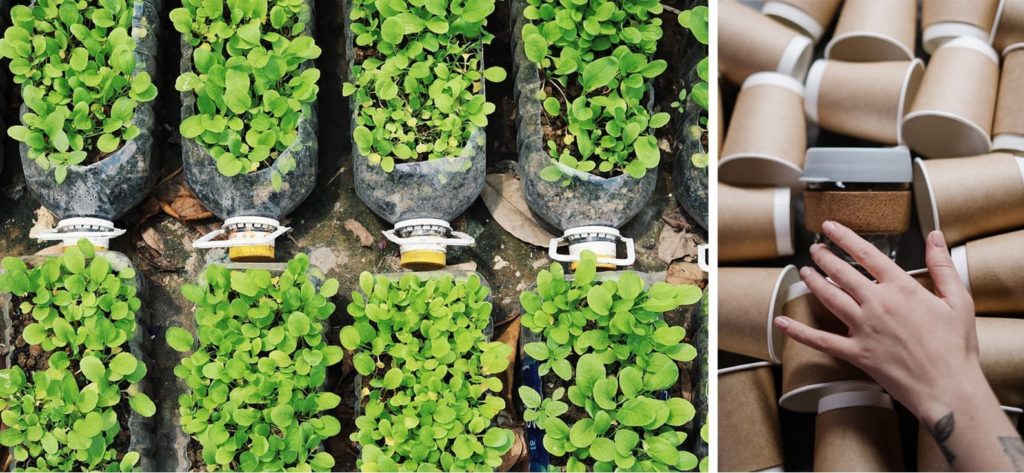How to Go Zero Waste
Do the following mental exercise:
You are in a supermarket, walking through the aisles and looking at the products that are on the shelves.
Is there a common denominator? Exactly. Most of the shelves are full of products packed in plastics.
Why go Zero Waste? Some alarming numbers
According to a study by the Rezero Waste Prevention Foundation based in Barcelona, 35% of the plasticsused in a supermarket are to package the products. That is to say, of a single-use.
Another alarming fact, recounted by Lidl, the first supermarket in the world to eliminate plastic bags in Spain, is that more than 14,400 tons of plastic bags are consumed per day in the world – the equivalent of 80 whales.
It is decisive to reduce the use of single-use plastic if we want to preserve life on the planet. Around 268,000 tons of plastic float in the ocean, each year, adding between 150,000 and 500,000 tons of plastic waste in the European Union alone, degrading into microplastics.

Why are microplastics dangerous?
Microplastics are tiny plastic fragments of less than 5 mm that accumulate mainly in the sea, where they are ingested by marine fauna.
We are talking about 1 million seabirds and more than 100,000 marine mammals that die, either from their intake in the form of microplastics, or from being trapped in nets or other plastics.
When ingested, microplastics become part of our food chain. It is estimated that a person eats approximately70,000 microplastics each year! So these plastics are present in everything we eat, drink and breathe. The impact and consequences that this new material can generate in our body is not sufficiently studied,according to Greenpeace.
The inactivity of brands and companies
The brands and companies that manufacture, distribute and sell these single-use products (made of plastic and other materials) have a legal obligation to recover and recycle 100% of the packaging sold. However, it is obvious that these companies do not take responsibility for fear of costs.
Today citizens are taking action in the face of the inaction of responsible companies, one of the most prominent is the Zero Waste movement. This movement aims to minimize waste every day. Zero Waste was born in the early 1970s in California thanks to Paul Palmer. He gave to researchers, scientists or other companies the laboratory materials from his chemical laboratory that were otherwise going to be discarded.
From the laboratory material, the idea was extended to the private lives of those people aware of the cause, integrating the concept of Zero Waste. The final name came from ecological activist Bea Johnson, recognized for driving the movement globally.
The goal is for buyers to stop being “couch activists” and seek to redefine the system to change the current linear economy by making it circular. In which all the waste returns to the system as if it were a cycle of nature. Every time we buy without unnecessary packaging, we demonstrate to governments, brands, department stores, multinationals and other establishments. We demonstrate that we DO NOT want to contribute to contamination.
What can you do to stop the irrational use of plastic?
As a consequence, it is possible to raise awareness in our communities and bring about the much-needed change in the policies adopted by our countries for the management of waste.
The result of the person who practices Zero Waste is a simplified life. And although it seems that in order to live that way you have to make a significant investment of money and time. Those who practice it assure that it has meant saving energy and resources. By buying durable or second-hand products and repairing what is damaged, with more free time for recreational, craft or travel experiences.

Simple steps if you want to take action:
This change that you will make in your daily life is a relearning of the customs that the market has instilled, questioning and recovering your true needs.
The 5 principles that form the basis of the Zero Waste movement help us integrate the necessary changes.
- Reject.
Simplify everyday purchases, share, repair what you already have, avoid single-use plastics, glasses, straws, plastic cutlery, coffee to go, samples from stores …
Plan ahead what you are going to buy. Evaluate, if you really need it, for how long you are going to use it, if you can borrow it or do it yourself.
The benefits are obtained in a simple and creative way, in addition you will gain space in your house.
- Reduce.
When buying food, going to the market or bulk stores, it helps you buy the exact amount you are going to use and consume products that do not come packaged in plastic.
As for household appliances, light bulbs, transportation, technology … Buy durable products to avoid having to constantly replace them.
You support local production, small and responsible commerce, with benefits for you and for the planet.
If you do not find alternatives, and it is not really urgent, leave it for next week. You can even try to make that product, such as gazpacho, juice, vegetable milk, or coffee. These options usually carry less chemicals and production costs than conventional ones.
- Reuse.
To purchase, bring your own containers:
- bag,
- trolley,
- backpack,
- bottle caps,
- jars,
- recycled egg cups,
- glass jars,
- reusable bottles
- other containers are some of the items you can carry.
Many of these are not necessary to buy. The jars of jams, legumes, yogurts are perfect to put the food you are going to buy inside.
It is about changing the look towards the residue. That wrapper can return to the quality of a useful object and go into circulation again. Everything will depend on your degree of imagination.
Paper printed on one side, clothing … Can you reuse it or give it before you throw it away? Do the same with the water. Get a glass bottle and fill it.
Bulk establishments are increasingly open to their consumers bringing their own containers so that they can place the product directly in the final container where it will be stored. Thus avoiding unnecessary packaging.
In other cases, it is necessary to make an initial investment: menstrual cups, cloth compresses, razors, metal or bamboo straws, etc. but in the long run, it helps you save.
- Recycle.
Although at this point you have probably already greatly reduced waste, if any material can no longer be reused, you can deposit it at the recycling points so that they re-enter the production chain.
- Compost.
In recycling, organic waste is very important. This can be used to compost and nourish our plants. In the absence of space or knowledge, in the following link you can see how to do it in your own house, on a terrace or in a small space, you can already compost.
Get tips from social media communities
If you have been interested in the proposal, social networks have already echoed the proposal, and there are different communities around the globe to talk and learn about it.
To enter one of them, just put “Zero Waste” in the Facebook browser and choose the one that suits you best. You will find more tricks, ideas and experiences that will help you implement this change in your life.
If you are more of Instragram, look for the hashtag #zerowaste and follow the accounts.
Do you know the theory of 21 days?
When you do something during that time, new neural connections are created, which help a punctual action become a habit and enter your routine without extra effort. It is as if you are building a new path in your brain to reach the goal quickly and effortlessly. Now is the time! What if we change that habit forever? What if millions of people do it? We would be facing the real end of waste pollution.
For more information on the ZeroP Festival download the press release (Spanish).